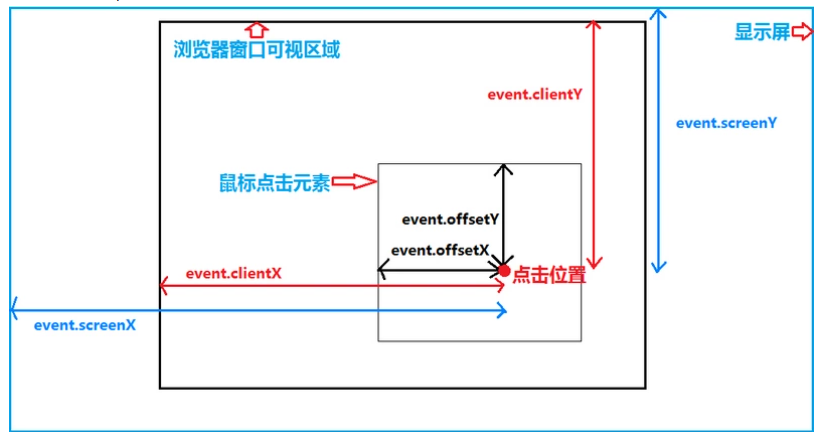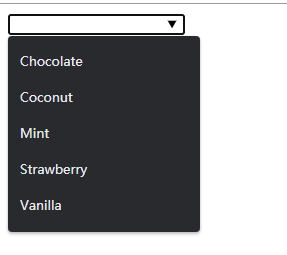原生技巧篇

pointer-event
css 指针事件属性
.aaa{
// 停止鼠标事件
pointer-events:none;
//
}
值
SVG
all:当指针位于填充或笔触上方时,该元素是目标。
stroke:当指针在笔划上时,该元素是目标。
fill:当指针位于填充上时,该元素是目标。
visible:当指针位于填充或笔触上并且填充或笔触设置为visible时,该元素是目标,而不管填充或笔划的值如何。
visiblePainted:当指针位于填充或笔触上时,该元素是目标,并且该填充或笔触被设置为visible,并且设置为非空。
visibleFill:指针位于填充上并且填充被设置为visible时,该元素是目标,而与填充的值无关。
visibleStroke:指针在笔划上并且该笔划设置为visible时,该元素是目标,而与笔划的值无关。
target 和 currentTarget的区别
<div className="aaa" onClick={this.clickDodo}>
<span>xxx</span>
</div>
clickDodo(e){
e.target.classList.add('ccc');
// e.currentTarget.classList.add('ccc');
}
我们会发现当点击span 的时候,会给span添加class
Event.target 和 event.currentTarget 都是对一个触发事件的对象的引用. 不同之处在于
Event.target
Event.target 对触发事件的对象的引用(即它标识事件发生的元素)
event.currentTarget
event.currentTarget 当事件遍历DOM时,标识事件的当前目标。它总是引用事件处理程序附加到的元素
screenX/Y,clientX/Y,pageX/Y 区别
client
可见区域的位置
pageX/Y
整个渲染页面的位置(包括滚动隐藏的部分)
screenX/Y
是显示器距离浏览器的距离

数组迭代 of
let arr = ['a', 'b', 'c'];
for (let [index,item] of arr.entries()) {
console.log(index,item);
}
// 0 a
// 1 b
// 2 c
类数组迭代
function sum() {
for (let item of arguments) {
console.log(item);
}
}
sum(1,2,3,4)
// 1
// 2
// 3
// 4
字符串迭代
迭代DOM集合
[...'abc'] [... document.querySelectorAll('a')]
字符串的问题
normalize()一种Unicode正规形式将当前字符串正规化所以思考,字符串安全吗?
const str1 = 'afé';
const str2 = 'afé';
console.log(str1 === str2); //false
console.log(str1.normalize()===str2.normalize()); //true
base
使用
<base>标记使所有链接在新选项中打开<head> <meta charset="UTF-8"> <title>Title</title> <base target="_blank"> </head> <body> <a href="https://www.baidu.com">百度</a> // 默认新选项打开 </body> </html>
datalist
自定义输入下拉列表
<input list="ice-cream" name="ice-choice"> <datalist id="ice-cream"> <option value="Chocolate"> <option value="Coconut"> <option value="Mint"> <option value="Strawberry"> <option value="Vanilla"> </datalist>
面向对象编程
链接到其他对象的对象(OLOO)
const Human = {
init(firstName, lastName) {
this.firstName = firstName;
this.lastName = lastName;
return this
}
};
//const a = Object.create(Human);
//a.init('a', 'b');
//console.log(a.firstName);
//console.log(a.lastName);
const a = Object.create(Human).init('a', 'b');
console.log(a.firstName);
console.log(a.lastName);
给一个函数原型添加多个方法
Object.assign(Human.prototype, {
method1() {
},
method2() {
}
})
私有变量
在js中,在变量前面加下划线
class Car { _fuel = 11; constructor() { } getFuel () { return this._fuel } setFuel (value) { this._fuel = value // Caps fuel at 100 liters if (value > 100) this._fuel = 100 } }使用
getFuel和setFuel获取或者设置属性但是通常来说也仍然也是一个公共变量
const car = new Car() console.log(car.getFuel()) // 50 car._fuel = 3000 console.log(car.getFuel()) // 3000
真正的私有变量
class Car {
#fuel = 50
}
class Car {
#fuel = 50
getFuel () {
return this.#fuel
}
setFuel (value) {
this.#fuel = value
if (value > 100) this.#fuel = 100
}
}
const car = new Car()
console.log(car.getFuel()) // 50
car.setFuel(3000)
console.log(car.getFuel()) // 100
不过我喜欢这种
class Car {
#fuel = 50
get fuel () {
return this.#fuel
}
set fuel (value) {
this.#fuel = value
if (value > 100) this.#fuel = 100
}
}
const car = new Car()
console.log(car.fuel) // 50
car.fuel = 3000
console.log(car.fuel) // 100
私有变量2
function Car() {
let fuel = 50;
return {
get fuel() {
return fuel;
},
set fuel(value) {
fuel = value;
}
}
}
let a = new Car();
console.log(a.fuel);//50
a.fuel = 10;
console.log(a.fuel);// 10
继承的使用
class Human {
constructor(firstName, lastName) {
this.firstName = firstName;
this.lastName = lastName;
}
sayHello() {
console.log(`hello,I'm ${this.firstName}`);
}
}
class Developer extends Human{
code(thing){
console.log(`${this.firstName} coded${thing}`);
}
sayHello() {
super.sayHello();
console.log('developer');
}
}
let b=new Developer('ssss','bbbb');
b.sayHello();
// hello,I'm ssss
// developer
不用class使用
function Human(firstName, lastName) {
return {
firstName,
lastName,
sayHello(){
console.log(`hello,${this.firstName}`);
}
}
}
function Developer(firstName, lastName) {
const human = new Human(firstName, lastName);
return Object.assign({},human,{
code(thing) {
console.log(`${this.firstName} coded ${thing}`);
},
sayHello() {
human.sayHello();
console.log('xxxx');
}
})
}
事件监听器的this问题
class Counter () {
// ...
constructor (counter) {
// ...
this.buttonElement.addEventListener('click', this.increaseCount.bind(this))
}
// ...
}
响应式
文件的形式
不同视口尺寸的样式表
<head>
<!--所有-->
<link rel="stylesheet" href="./test1.css" media="all">
<!--屏幕至少大于900px-->
<link rel="stylesheet" href="./test2.css" media="(min-width:900px)">
<!--屏幕至少大于1200px-->
<link rel="stylesheet" href="./test3.css" media="(min-width:900px)">
<!--用于打印的配置颜色-->
<link rel="stylesheet" href="./test2.css" media="print">
</head>
引入文件
<style>
/* 所有屏幕适用 */
@import url("style.css") screen;
/* 打印 */
@import url("print.css") print;
/*至少小于800px*/
@import url('./test2.css') screen and (max-width: 800px);
/* 用于手机纵向*/
@import url('landscape.css') screen and (orientation: portrait);
</style>
内联
<!--至少小于800px-->
<style media="all and (max-width:800px)">
body {
background-color: #ff6259;
}
</style>
行内
<style>
/* 小于600px*/
@media screen and (max-width: 600px) {
body{
background-color: #ff6708;
}
}
/* 大于600px小于1000px*/
@media screen and (min-width: 600px) and (max-width: 1000px) {
body{
background-color: #ff00b0;
}
}
/*小于1000px*/
@media screen and (min-width: 1000px) {
body{
background-color: #004aff;
}
}
</style>
js的操作
const mediaQ=window.matchMedia('(min-width:1000px)');
if (mediaQ.matches) {
console.log('屏幕大于1000px');
}
可以使用`resize` 进行事件监听(以前使用window.innerWidth或者window.innerHeight 进行触发)
决定自己的高度的是你的态度,而不是你的才能
记得我们是终身初学者和学习者
总有一天我也能成为大佬





 浙公网安备 33010602011771号
浙公网安备 33010602011771号